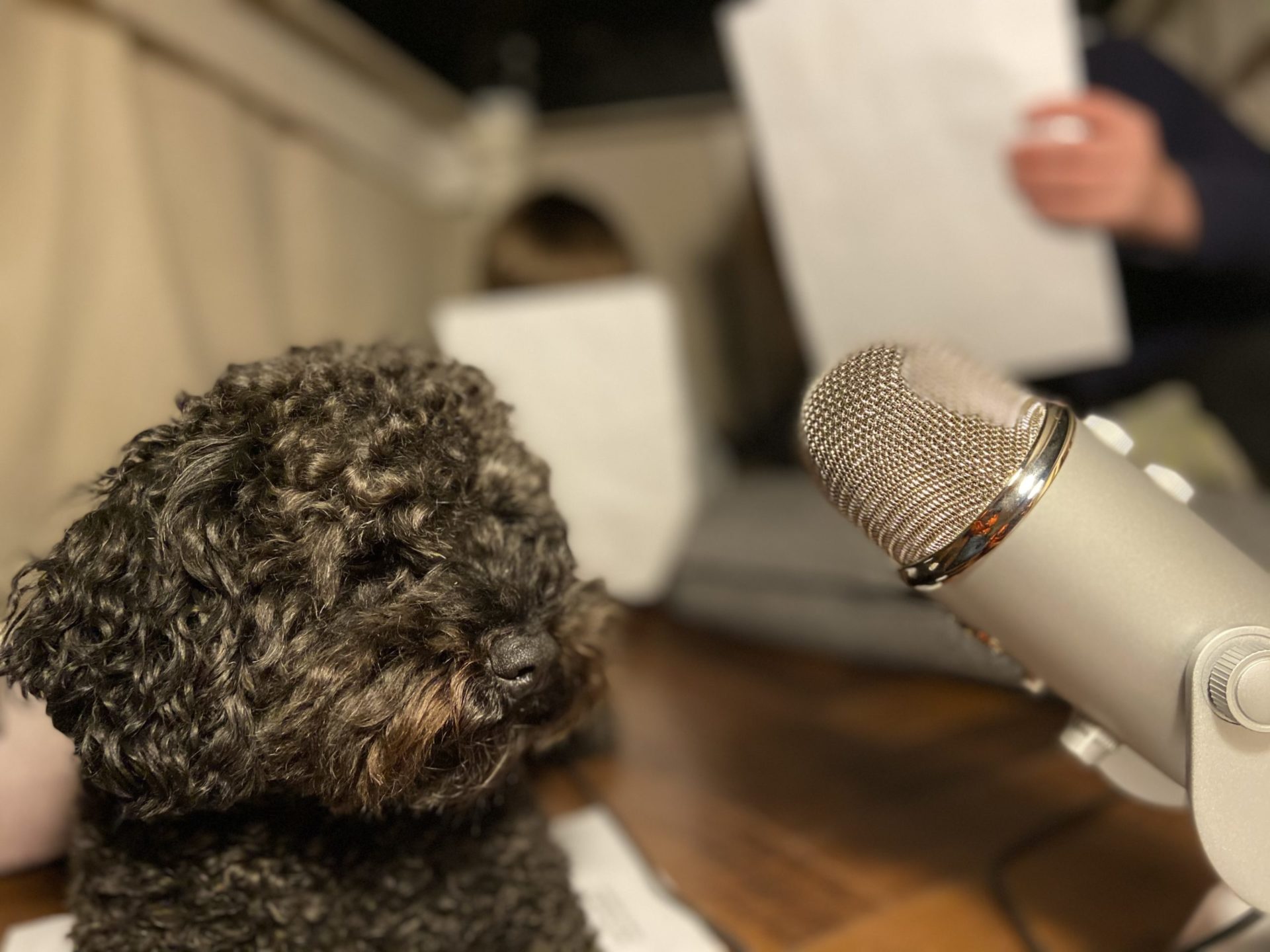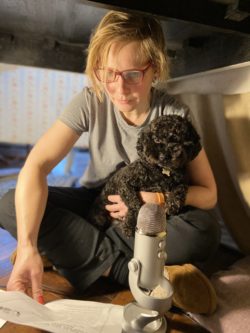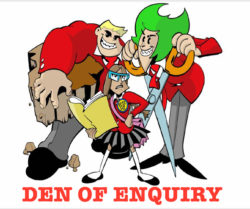Using poetry to kick start conversations about democracy with children

In our latest blog post, CDE PhD student Miranda Duffy, tells us about the DEN of ENQUIRY, a podcast she recently launched for 9-12 year olds, to kick start conversations about democracy.
How do we explain the significance of the storming of Capitol Building to the kids? What does democracy mean to a ten year old? In this blog post I outline how I’ve tried to do this, through my DEN of ENQUIRY, an initiative to experiment my research methods whilst my practical fieldwork is on hold due to coronavirus. DEN of ENQUIRY podcast allows me to use creative research methods to enrich youth political literacy in a live environment. This experience has generated insights that will feed directly into my doctoral enquiry.
About DEN of ENQUIRY
DEN of ENQUIRY is a podcast that aims to encourage adults to engage children aged 9+years with conversations about democracy. It’s a spin off from my doctoral research that explores how an arts-centred approach (Arts Integration) can further an understanding of democracy and the rule of law amongst 10-11 year olds to enrich Citizenship Education in the UK.

Miranda Duffy - DEN of ENQUIRY
Each episode contains an original poem that introduces a topic relating to democracy, individual liberty or the rule of law. Questions to date have included: what is democracy? What is individual liberty if I have to go to school/do schoolwork every day? And, how can we engage pre-teens with complex ideas if they don’t want to listen?
My co-hosts are my two youngest children (ages 11 and 9, code names Carrot and Sir Nincompoop respectively). We build a makeshift den-cum-recording studio under our kitchen table and are supported by our studio audience, Woof. This creates a relaxed but dedicated environment akin to a theatre set that is, first and foremost, about having fun.
To give an example of an episode, we use a limerick to explore why Big Ben is important as a symbol of democracy (episode, 19th January 2021):
When Big Ben strikes on the hour / Up high in Elizabeth Tower / It tells not just the time / But acts as a sign / Of Parliament’s source of great power.
Limericks are great fun. They are short (always good), and because they have a predictable sound, rhythm and rhyming scheme, the content rather than poetic form takes centre stage. By breaking down the limerick, I can introduce a number of questions to spark a debate. Firstly, a general discussion:
- What are signs/symbols – are they the same thing?
- What are signs/symbols of democracy?
- Why do they matter?
Secondly, once an overview to the topic has been set up, specific questions from the limerick can be posed:
- What is Big Ben?
- What is Elizabeth Tower?
- Why is it significant that it is ‘up high’ and dominates the skyline?
- Of what is Big Ben a sign?
- What is Parliament’s source of great power?
From this discussion, I can connect the question of the day to current affairs - in this instance, the storming of Capitol Building.
Engagement and results
The podcast has worked very well to date and I am delighted by the discussions it has stimulated. Carrot and Sir Nincompoop have been able to access and engage with the topics, as well as formulate answers to the questions. Most importantly, their enjoyment and interest is genuine. This indicates that the process, level at which it is pitched, and format work. A positive knock-on effect is that they have transferred this openness to other (mostly science-based) podcasts that prompt their critical thinking skills and spark further debate.
Over the course of the series I have observed the extent to which Carrot and Sir Nincompoop’s engagement is contingent on four factors:
- They are conscious of entering into an out-of-the-ordinary world that has discrete rules (such as not discussing personal information);
- The whole experience is viewed as entertainment and their contribution depends on having fun;
- Their enjoyment is enhanced by being trusted, and given a new and unusual responsibility;
- The best results (in terms of enthusiasm, concentration and focus on the question in hand) are generated when the children feel secure in what they are expected to do.
Building a den-cum-recording studio under our kitchen table has a two-fold purpose. The first is practical as the quality of sound can be affected by hard surfaces and open spaces pick up background noises. Secondly, it creates an imaginative gateway that allows us to leave our familiar environment (and all the distractions thereof) and step into a dedicated space for an allocated time that mirrors the experience of going to a live theatre production.
An additional step into this gateway is taken as they enter their roles as the cast/co-hosts and take on the character names of their choice. This acts as a buffer and helps them to build the confidence to embrace speaking in a private-public arena.
The Den works because the children approach it as entertainment; this element is a fundamental part of breaking down barriers to access complex ideas. Furthermore, we use humour as a means to elevate over sticky points – put simply, the children are willing to persevere and give it another go if they are laughing rather than embarrassed or frustrated at giving what they perceive to be the ‘wrong’ answer (although I suspect Sir Nincompoop will never be allowed to forget that she once confused Britannia with a donkey).
By distributing the Den through my productions company, I have exhibited a level of trust in my belief that we, as a team, can create and produce a professional podcast. The children understand that this is not just a hobby or a means to fill a Saturday afternoon in lockdown, but an opportunity for their voices to be heard. In return, they take the podcast seriously and step up their efforts to make it work.
The best results have been generated when the children have clear boundaries and are free to focus on what they are saying, rather than how to say it. From the start it was established that they do not have a responsibility to entertain or educate, but instead are asked simply to concentrate on the conversation; as a result, their contributions are usually both entertaining and informative. This balance is largely instinctive and is grounded in our rapport.
Lessons for my research fieldwork
DEN of ENQUIRY has highlighted the importance of the four factors above and I will ensure that each point is adapted and factored into my fieldwork. My fieldwork programme will utilize a mixed methods approach that combines traditional methods such as paper-based surveys with Action Research. It will be conducted in four 1hour sessions in a primary school classroom in addition to one-to-one interviews with class teachers.
An imaginative gateway will be replicated through drama-based games, scripts, costumes, and role-plays that encourage students to ‘become’ journalists and report back to the class on what they have learnt. Time will be spent playing games in order to build a rapport and trust with the students and foster a discursive, open environment where participants have fun and respond positively. The paper-based surveys will include questions on how much they have enjoyed the activities and sessions overall.
Trust will be demonstrated by communicating what my research hopes to be achieve and how it will be used going forward. This will be balanced carefully with clear boundaries of what is expected, and will be part of my ongoing reflection into the dynamic between me as the adult researcher and the children as participants.
A final insight that will be taken forward is the use of language. On reading the transcript of each episode, I am struck how often I say ‘that’s right’, or ‘that’s it’. Whilst this is meant to be an encouraging signal, I am conscious these phrases have the potential to impose my own rather than a child-centred path by confirming a ‘correct’ direction. Therefore, analyzing the language used will be an integral part of my reflection as a researcher.
Summary
 DEN of ENQUIRY has allowed me to experiment with creative research methods in a live environment and has produced core insights that will feed directly into my research fieldwork. It has emphasized the need to create an imaginative gateway and highlight a commitment to respect the children’s voices.
DEN of ENQUIRY has allowed me to experiment with creative research methods in a live environment and has produced core insights that will feed directly into my research fieldwork. It has emphasized the need to create an imaginative gateway and highlight a commitment to respect the children’s voices.
Furthermore, objectives and outputs must be clearly defined, and time and effort invested in building trust and a rapport with the students in order to break down barriers. Achieving a balance that serves my research objectives, entertainment and enjoyment is an active and ongoing process.
The podcast has also given me confidence and strengthened evidence produced from previous theatre-based productions that arts-centred learning works. There is a place in youth political literacy initiatives to celebrate the musicality and joy that the arts can generate and in doing so, create access points to engage children with democratic ideas.
For more information:
DEN of ENQUIRY is free to access on Apple, Spotify (no account required), Google and other podcasting platforms:
Five episodes are available currently with at least another three planned in this current series. Episode duration: approx. 15minutes
Accompanying lesson plans are free to download from TES.com (search RollickingPolitics - free to access but a log in is required)
To view a showreel of ‘Rox Paper and The Scissors’, a theatre show about democracy for 9+years visit the Rollicking Politics website or this YouTube clip. Tw: @RollickingP; Fb: @Rollicking Politics
